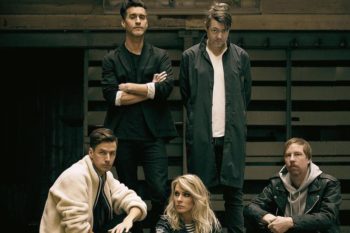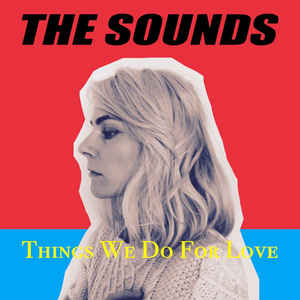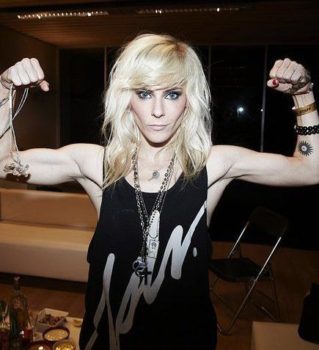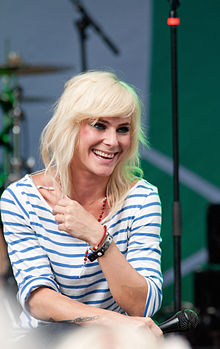Interview: Swedish Chanteuse Maja Ivarsson Of The Sounds
Swedish band The Sounds have just released their new album, Things We Do For Love, their first in 7 years.
The 13th Floor’s Marty Duda spoke to singer/ guitarist/frontwoman Maja Ivarsson about the new record. But first, an enlightening discussion on how Sweden has dealt with the Covid crisis. With a population of 10 million, Sweden has controversially decided not to lock down the country. However their death rate is among the highest in the world. https://www.stuff.co.nz/national/health/coronavirus/300027183/coronavirus-swedish-disease-expert-admits-covid19-mistakes
Click here to listen:
Or, read a transcription of the interview here:
M: Right now, I’m just curious because I don’t know if you read about New Zealand’s interaction with the covid thing, but I know Sweden is having a different experience than we have here so I’m just wondering how things are over there?
 MI: Things are quite good I think, I mean, It’s hard to imagine what it would be like for you or for anyone else in the world who’s been having such a total lock down or quarantine situation but I think nobody really knows until this whole thing is over, nobody knows if we did the right decision or the wrong decision. To me, I feel like if there’s gonna be a second wave, then we all need to be outdoors anyway. You can’t lock people in for too long and I think the consequences afterwards is gonna be way worse. Like domestic violence, the economy, the collapse. The aftermath is way more scary I think than the actual virus itself. And I think in that sense, Sweden might be a little ahead of everyone because we haven’t had a total lockdown.
MI: Things are quite good I think, I mean, It’s hard to imagine what it would be like for you or for anyone else in the world who’s been having such a total lock down or quarantine situation but I think nobody really knows until this whole thing is over, nobody knows if we did the right decision or the wrong decision. To me, I feel like if there’s gonna be a second wave, then we all need to be outdoors anyway. You can’t lock people in for too long and I think the consequences afterwards is gonna be way worse. Like domestic violence, the economy, the collapse. The aftermath is way more scary I think than the actual virus itself. And I think in that sense, Sweden might be a little ahead of everyone because we haven’t had a total lockdown.
M: We did.
MI: Of course.
M: We were locked down.
MI: How are things over there?
M: Well they’re good now because it’s all over with. We’ve had no new cases of the virus in like a month, we only had twenty two people die from the virus the whole time. But we were all locked down for two or three months, it was pretty serious and a lot of people have lost a lot of jobs and work is scarce these days and everybody’s kind of wondering how that’s all gonna shake out so the economy is the big thing now.
MI: Yeah, I see. And we’ve had way more casualties here. How big of a population is it in New Zealand?
M: We’ve got about half that you have. We just hit five million and I think you have ten million right?
MI: Yeah, but still you’re twenty two people that’s nothing. I’m really happy for you and I think every death is a tragedy and obviously it’s mostly elderly.
M: Absolutely yeah.
MI: Old people’s home, places. It’s really sad, I mean like, my mom has been, I think we’ve been trying to keep elderly, like my mom’s age around their seventies, they had to be locked down but I’m happy I’m able to leave my kid at the pre-school and I can still work in the studio and keep my head balanced. I think there’s good and bad in both decisions.
M: Absolutely. So you’ve been working right through the whole thing and working on music are you?
 MI: Yeah, which is really such a luxury. I think that is the only good thing about not being able to tour. I mean, I can spend time with my son and I can be in the studio writing music and now that the summer is here I think we can enjoy that as well so I’ve been trying to be as efficient as I can be.
MI: Yeah, which is really such a luxury. I think that is the only good thing about not being able to tour. I mean, I can spend time with my son and I can be in the studio writing music and now that the summer is here I think we can enjoy that as well so I’ve been trying to be as efficient as I can be.
M: So you were supposed to be touring the States during the summer is that right?
MI: Exactly. And we were supposed to be done by now and then we have summer shows, festivals and then we were supposed to do a tour in the U.S in the fall, which is not cancelled yet, but I assume that’s what’s gonna happen.
M: When that happens to an outfit like yourselves, what kind of ramifications are there? What happens to you guys? Do you just lose lots of money or do you find something else to do? How does it work?
MI: Both. We do lose a lot of money and I’ve tried to find something else to do but it’s super hard. It’s really difficult cause summer shows and festivals, that’s where you make the most money. But I’m also glad that we’re such an established act and we’ve been around for over twenty years because if I was a debut artist and this would be our first album, it would be devastating. Now I know we have such a solid fan base and whenever we were able to come out on the road again, I know they will still be there, our fans. That’s why I’m happy we’re already such an established band.
M: And of course you have a new album out that just came out like last week called Things We Do For Love which is your first record in like seven years so what’s been going on there? What have you been doing?
 MI: Well, I became a mom five years ago and we did release an EP which kind of flew under the radar for most people. But I think the keyboard player, he has two kids now and I think if you’ve been in a band since high school and you’ve been touring the world and you’ve been playing shows and living in a tour bus for the most part of your life, it was about time. When I became pregnant, I was like this is such a well worked break for me and I wanna be able to concentrate on being the best mum I can be and give him all my attention as a child deserves. It was such a blessing for me to have a legit reason to say I’m not going out on tour for a while.
MI: Well, I became a mom five years ago and we did release an EP which kind of flew under the radar for most people. But I think the keyboard player, he has two kids now and I think if you’ve been in a band since high school and you’ve been touring the world and you’ve been playing shows and living in a tour bus for the most part of your life, it was about time. When I became pregnant, I was like this is such a well worked break for me and I wanna be able to concentrate on being the best mum I can be and give him all my attention as a child deserves. It was such a blessing for me to have a legit reason to say I’m not going out on tour for a while.
M: Fair enough.
MI: Yup. You want to experience something else in life that just being in a rock band and that’s what happened for at least five years.
M: So, is the plan to kind of go at it full force again? Or are you kinda taking it step by step?
MI: I mean, I’m not gonna be able to do two hundred and twenty shows a year any more as we used to. But we did a U.S run when he was only two and a half years old and he was with me in Stockholm and he’s very much used to sleeping in tour buses and doing the whole tour thing. But yeah, something kinda in the middle I think would be what we’re aiming for and for me to write music is my new found love again so being in the studio is really nice for me.
M: Excellent. So the album, Things We Do For Love, the songs that are on that, are they mostly written relatively recently? Or are they stretching throughout the seven year timeline?
MI: Some of them are quite old and some of them are more recent. It’s usually like that, I think you write as many good songs as you possibly can and then you kinda select the ones that you like the most and you think is gonna suit the album. Some of them I would say are at least four, five years old, some of them are just written maybe a year ago.
M: When were they recorded? Where they all recorded in one lump or where they spread out over a bit of time?
MI: We do have our studio so whenever we write something and it’s usually, we do a demo but we record everything ourselves so we don’t have any engineering or engineer and we don’t have to book a real studio, we have our own. So whenever we record it we can always save it in the computer and then whenever it’s time to send it to mix it’s already done. That is such a luxury too for us.
M: I can imagine it would be. It’s almost hard to believe that it was done so differently back fifty years ago when you had to look at the clock.
MI: We’ve done that too. And it’s nice in one way cause you have to really concentrate for the amount of weeks that you’ve booked the studio, but it’s also draining. You know you have to nail these songs and if the producer’s not really as you would hope he was gonna be like, it’s such a waste of money too. By now, six albums later, we know what we wanna sound like, we know what kind of production we need and arrangements and everything so we’re quite good at it ourselves I think.
M: It sounded like it yeah.
MI: Thank you.
M: The sound that you have, like you say you know what you sound like, but do you feel any difference in the sound or the songwriting that has changed or evolved over the last seven years since the last record?
MI: Inevitably I think we’ve become better at our instruments but at the same time, we’re not really good musicians. Maybe Jesper is. And I think that is a good thing cause I dislike when bands become too professional and they start to become intellectual with their music and I think music should never pass your intellect, it should go straight to your heart or to your belly and I think we’ve been able to keep that sense of rawness in our music and I think the five of us, we’re still the same band members since 1998.
M: Nice.
MI: Yeah, and I think we have a certain sound. The way we play together and the way we write music together. The five of us get together since we’re the same band members since the beginning, since 1998, I think whatever we try to do differently, we will always sound like us for good or bad. Yeah, I lost myself too, I think that’s what I was trying to say.
M: That’s alright, we’ll move on. One thing that’s a definite part of what you do is dance music for a good portion of this new album and I assume you’ve been doing that before, and as you get older, is it harder to relate to that kind of music? Because most people think of dancing is a young person’s game, I’m wondering if that comes into the equation at all?
 MI: No, I don’t think that is a young person’s game. It’s a funny way to put it but I think for me I’ve always had electronic elements as my biggest influence. I grew up with older siblings and they were all into Depeche Mode and Front 242 and even Einstürzende Neubauten and like obscure German music or Kraftwerk and I think we’ve always had those elements. I think we were quite early on, with combining the two elements of doing rock music and electronic music and we kind of brought back the new wave era in the early 2000s and I think now we’re just evolving into whatever we feel like at the moment and we’ve never really have like a blueprint of what kind of song we want to write, it just ends up like that. We’re all very creative in the band so whoever is writing at the moment and whatever influences you’re into at the moment is deciding whatever kind of song you will write too. Now when I listen back to the album, I actually did last night, I was like yeah, it’s quite electronic. I never really reflected on it too much; it’s just what happens in the studio, which I like about songwriting. Sometimes it feels like the song is writing itself more than I’m in charge of it.
MI: No, I don’t think that is a young person’s game. It’s a funny way to put it but I think for me I’ve always had electronic elements as my biggest influence. I grew up with older siblings and they were all into Depeche Mode and Front 242 and even Einstürzende Neubauten and like obscure German music or Kraftwerk and I think we’ve always had those elements. I think we were quite early on, with combining the two elements of doing rock music and electronic music and we kind of brought back the new wave era in the early 2000s and I think now we’re just evolving into whatever we feel like at the moment and we’ve never really have like a blueprint of what kind of song we want to write, it just ends up like that. We’re all very creative in the band so whoever is writing at the moment and whatever influences you’re into at the moment is deciding whatever kind of song you will write too. Now when I listen back to the album, I actually did last night, I was like yeah, it’s quite electronic. I never really reflected on it too much; it’s just what happens in the studio, which I like about songwriting. Sometimes it feels like the song is writing itself more than I’m in charge of it.
M: That’s always a good sign I think when it kind of takes on a life of its own.
MI: I think so too.
M: Yeah. Really, the only guitar driven rocker is Stay Free and the other ones are definitely more electronic and dance orientated.
MI: For sure. Me and Felix, the guitarist and I, we started an electronic duo two years ago called Crew of Me and You and I remember writing songs for that project. Some of the songs didn’t fit the new project and those songs ended up on the Sounds albums. Safe and Sound is one of them. So it definitely has an electro vibe to it but we tried to add some New Order influences and stuff like that as well. It suited The Sounds better than the other project, but I think they kind of overlap.
M: What kind of music scene is happening in Sweden where you are? Are there a lot of bands that sound like you or is it diverse? Is it very vibrant at all there these days?
MI: At the moment, I would say a lot of bands and musicians and singers are singing in Swedish at the moment. There’s a lot of Swedish hip hop. I think the EDM scene is kind of dying. But we still have so many good Swedish songwriters, you just have to check out like Billboard and every other song is written by a Swede.
M: That’s true.
MI: Yeah, and I think we do have a certain kind of sound and very melodic and we’re more melody driven than beats. In the scene right now, I would say a lot of artists are singing Swedish at the moment.
M: Because I guess Sweden has a legacy of being very melodic. I mean all the way back to ABBA and of course Roxette and other folks so does that kind of influence what you guys do now, do you think about that? Or is it just kind of ‘in the water’?
MI: I reflected on it recently, especially the last couple years when I’ve been singing lullabies to my son and I realised that most Swedish lullabies, it’s all in minor, it’s all very sad, very melodic and it’s always about some poor guy who, his clothes all ripped and he’s blind and he’s limping and it’s really sad stories and all of them are very melodic but very sad and I think that is something that we have in our heritage. Even going back to Swedish folk music, it’s always quite, a lot about nature and rough times and it’s quite sad. But it’s also very beautiful and I think maybe it is something that we carry with us as musicians too and also I’ve thought about, you know Eurovision?
M: Yup.
MI: I think that is also something that we have in our history of very efficient songwriting because you can only do a song for three minutes long and it should be catchy and it should have a hook right away and you should be able to remember the song the first time you hear it. We grew up with that kind of music and I think that also comes into our songwriting whether we like it or not, but it’s quite efficient and very catchy songs that we do.
M: Now the other thing that I noticed just from talking to you, and I hope this doesn’t come across as condescending or anything, is your English is incredibly good, better than most Americans that I know. Me being American I can say that.
MI: Thank you.
M: Is that just the way it is in Sweden? Is it a bilingual society over there?
MI: I would say so and obviously I’ve been touring in the States for many years, so I think I’ve picked up a lot of my accent from just spending a lot of time in the U.S. I think in Sweden, you have to learn English at such an early age cause you can’t rely on everybody else in the world to speak Swedish so you know you have to make yourself understood in the world by studying English at a very early age. And we study German and French and Spanish too. And I think it’s necessary to have such a language as Swedish, nobody speaks Swedish.
M: But that attitude of knowing that you have to learn all these other languages because no one’s speaking yours, must give you kind of an open mindedness about other people, whereas, I know growing up in the States I never even considered the fact that I had to learn anything other than English. I took a French class or two in high school and that was it and it’s a very different mentality.
 MI: Yeah, and I think that comes from just being from a small country. You know you have to be open minded because you can’t be, as I said, yeah. You do sound American I’ve met so many Americans who, they don;t even have a passport, they’re adults, they’re like I don’t need to leave this country, we’ve got it all. If you come from such a huge continent and a country I think you are more, how do you say, you don’t really need to. But we do if you want to be able to communicate and to meet other people. We need to be able to travel and speak other languages. Surely it comes with that.
MI: Yeah, and I think that comes from just being from a small country. You know you have to be open minded because you can’t be, as I said, yeah. You do sound American I’ve met so many Americans who, they don;t even have a passport, they’re adults, they’re like I don’t need to leave this country, we’ve got it all. If you come from such a huge continent and a country I think you are more, how do you say, you don’t really need to. But we do if you want to be able to communicate and to meet other people. We need to be able to travel and speak other languages. Surely it comes with that.
M: I was wondering if that openness about other cultures and languages, feeds into your music and well. I mean, you probably have a bit of Krautrock like you mentioned and some other things in there, but is it more likely to be part of what you do than say an American band?
MI: What I’ve noticed is that Swedish songwriters are very, we have a lot of good work ethics but also very disciplined but we’re also quite not selfish. It’s always for the better, the songs should be as good as possible and if that means that eight other people should come in and be co-writing for a song, it’s for the better if the song becomes better. And I think a lot of American songwriters are more egocentric in the sense of I wrote this one, no one should touch it, this is my song. And I think we’re more open minded to collaborate and to hear other people’s opinions about what they think should be better for the song. And maybe that comes from the social democracy that we’ve had for ages.
M: That would help.
MI: Yup. Look at America now, maybe…
M: Yes. Things are changing hopefully over there but we’ll see.
MI: Yeah, I hope so too.
M: So are you guys able to tour and play out in Sweden or do you have to wait for things to calm down as far as the covid thing?
MI: Yeah, we can’t tour or play any shows in Sweden or anywhere else. We’ve been doing a live stream show from our local venue which is really nice. We had 200,000 views from all over the world checking us out that night which was really flattering. Apart from that we can’t do any shows at all, it’s really sad.
M: We’re kind of in a weird situation where everybody in New Zealand is fine, but there’s only five million of us and there’s x amount of local bands so there’s no overseas bands coming in to fill up the big arenas and that’s becoming a problem with the local music business here, but I’m sure that’s happening everywhere.
M: Exactly. All the promoters and venues…you don’t know if the venues are still gonna be there when we come back. I mean, I don’t think a lot of people think about that and even bus companies or tour managers and guitar techs, everybody is out of work right now which is a pretty big business.
M: Yeah. Well hopefully you’ll be back on the road soon. Have you been to New Zealand?
MI: No, I’ve been to Australia but never New Zealand.
M: Well it’s close but no cigar.
MI: It sounds amazing.
M: You’ll have to come down and play.
MI: I would love to.
M: Excellent.